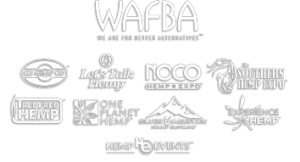One Organic Farmer Treats Hemp Grown for CBD Like a “Specialty Vegetable Crop”
By Steven Hoffman
Compass Natural
The importance of certified organic in hemp agriculture cannot be overstated. Currently, nearly 80,000 acres are in hemp production in the U.S., and very few of them are certified organic. That means that the majority of hemp produced in the U.S. is being grown conventionally, using potentially toxic, synthetic pesticides and synthetic nitrogen fertilizer derived from the fracking of natural gas.
Frankly, that’s not very good for the environment or for the oncoming climate crisis, as conventional agriculture is one of the largest non-point sources of global greenhouse gas (GHG) emissions contributing to global warming, and fracking releases massive quantities of methane – another potent GHG – into the atmosphere. On the other hand, organically grown hemp can actually sequester carbon out of the atmosphere and put it back in the soil where it belongs, helping to keep CO2 and other noxious GHGs out of the atmosphere.
Additionally, when given a choice, I’ll choose CBD and hemp extract products that are produced and processed organically, thus minimizing my dietary exposure to toxic pesticide residues and other chemical solvents, because who wants pesticide residues included with their concentrated botanical medicine?
Seeing the explosive growth of the hemp market in the wake of the 2018 Farm Bill, the organic industry’s leading trade association, the Organic Trade Association (www.ota.com) invited my communications agency, Compass Natural, to help plan and present an educational track focused on farmers’ perspectives and market opportunities for certified organic hemp, CBD and related products as part of OTA’s annual Organic Week policy conference, held May 20-23, 2019, in Washington, D.C. OTA’s Organic Week draws organic industry leaders from across the U.S. to interact with policymakers and Congressional leaders to help forward the interests of organic food and agriculture.
At the Organic Week conference, OTA announced that sales of organic products in the U.S. surpassed $50 billion, growing 6.3% to reach a record $52.5 billion in 2018. Almost 6% (5.7%) of all food sold in the U.S. is now organic, driven in large part by demand for organic produce, dairy, plant-based products, dietary supplements, textiles and fiber. “Organic is now considered mainstream. But the attitudes surrounding organic are anything but status quo,” said Laura Batcha, CEO and Executive Director of the OTA. “In 2018, there was a notable shift in the mindset of those working in organic toward collaboration and activism to move the needle on the role organic can play in sustainability and tackling environmental initiatives.”
Lobbying for Hemp
As part of OTA’s Organic Week, I was scheduled to visit several congressional offices on Capitol Hill, lobbying on behalf of organic food and farming and industrial hemp, CBD and related products. The staff at the offices of Colorado Senators Michael Bennett and Cory Gardner were supportive of industrial hemp in our meetings, and in alignment with Colorado Governor Jared Polis’ goal of furthering Colorado’s leadership in industrial hemp, as were staff leaders in the offices of Colorado Representatives Joe Neguse and Diana DeGette. However, staff at the offices of Idaho Congressmen Russell Fulcher and Mike Simpson deferred to their state’s legislature when it came to my questions regarding Idaho’s seizure in January of a container shipment of industrial hemp from a licensed grower in Oregon bound for processing in Colorado, despite the 2018 federal Farm Bill declaring that interstate transport and commerce of hemp-derived products is now legal throughout the U.S.
In addition to our Capitol Hill visits, I moderated a lively seminar attended by a number of organic farmers interested in or already growing hemp for food, supplements and fiber as part of an educational track focused on hemp during OTA’s Organic Week. At the seminar, longtime organic farmer Chris Jagger, owner of Blue Fox Farm in Oregon, shared how he began growing hemp three years ago. Instead of planting hemp densely, like they do for fiber production where tall stalks and little foliage are desired, Chris farms his hemp like a specialty crop, or “like vegetables,’ he says, to cultivate the delicate hemp flowers for CBD extraction. Currently, a small number of organic certifiers, including OneCert, CCOF and MOSA are certifying farms for organic hemp production, and rumor has it some other major certifiers will soon follow.
At the same time across town, hemp advocate Ben Droz participated in the inaugural Congressional Cannabis Forum hosted on May 21 by Washington, D.C.-based KCSA Strategic Communications. “While covering all aspects of the cannabis market, the KCSA forum presented a hemp panel that examined capital markets and the global economic implications of the legalization of hemp under the 2018 Farm Bill,” said Droz. “If hemp extracts become a global commodity, it might not necessarily benefit small scale farmers and producers,” he cautioned. “However, until the FDA comes up with more clear guidelines concerning hemp products, the big corporate players will continue to sit on the sidelines, allowing time for smaller brands to establish and build market share, but that could change at any time,” he said. Droz noted that the FDA scheduled its first public hearing on hemp and CBD in food and beverage for Friday, May 31, 2019. Information on the hearing is published in the Federal Register.
Organic agriculture is a bright spot in the U.S. farm economy, continuing to grow at a rate more than double the growth rate of the overall U.S. food market. According to new OTA data, the number of organic farms grew by 39% while the total number of farms in the U.S. shrank by 3% between 2012 and 2017. Organic products can now be found in more than 82% of U.S. homes, and in some states, including California, Arizona, Oregon, Washington and my home state of Colorado, organic products are in over 90% of U.S. households. Here’s hoping that organically produced hemp follows suit.
# # 
Steven Hoffman, is Managing Director of Compass Natural, dedicated to providing brand marketing, public relations, social media, and strategic business development services to natural, organic and hemp-centric businesses. Hoffman also serves as editor of the Let’s Talk Hemp Weekly Newsletter. Contact steve@compassnaturalmarketing.com.
Photos: Compass Natural




